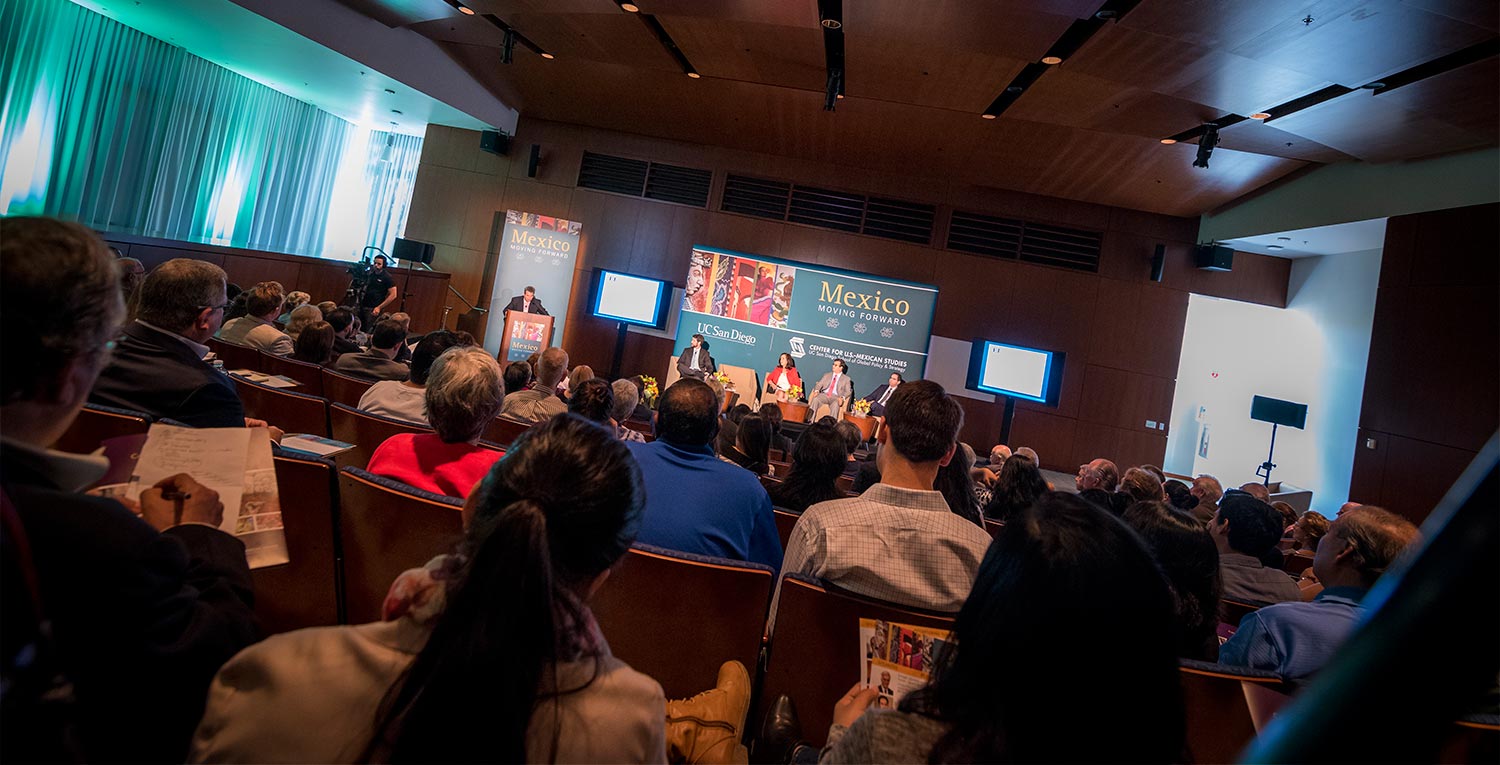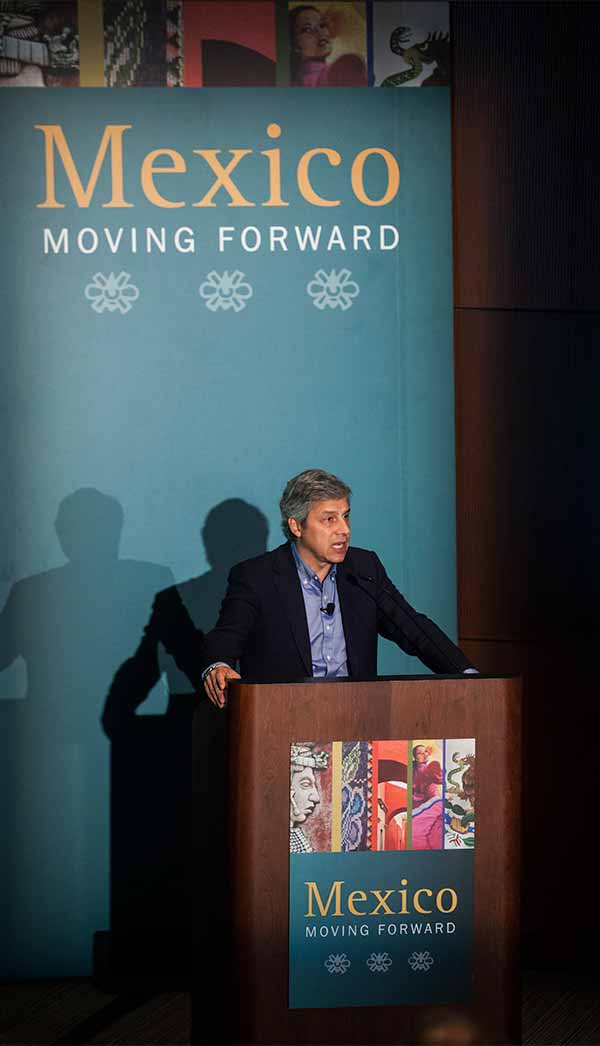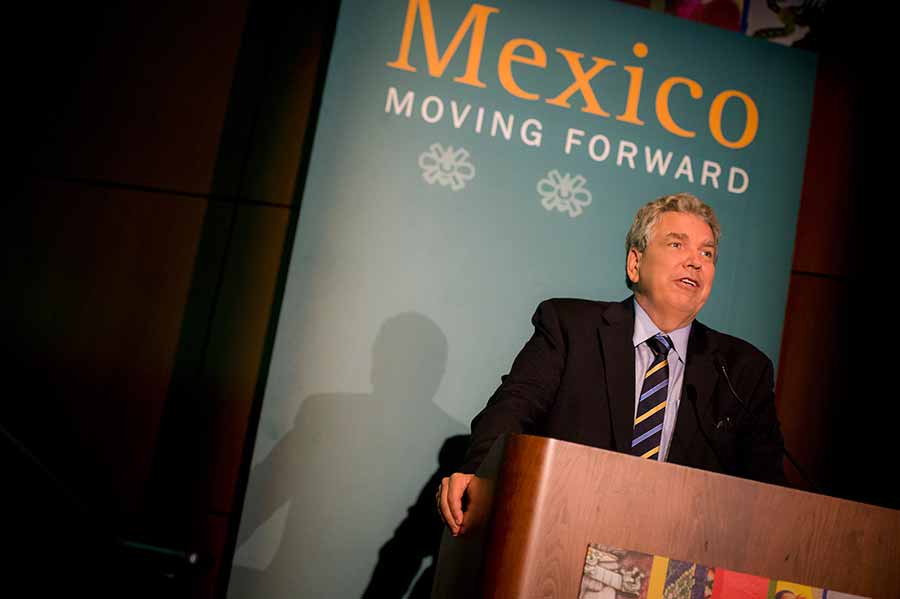UC San Diego Among Multidisciplinary Awards Providing $221M Nationally for Cutting-Edge Projects
Technology & Engineering
By:
Published Date
By:
Share This:

Photo by Erik Jepsen/UC San Diego Publications (unless otherwise noted)
Education reform was a key focus of this year’s Mexico Moving Forward symposium, organized by UC San Diego’s Center for U.S.-Mexican Studies. The two-day event brought a packed house of academic, political and civil-society leaders to campus Oct. 29 – 30 for talks in part addressing a series of reforms the Mexican government adopted in the last three years. Called “Recapturing the Mexico Moment,” the symposium included experts on some of the most important reforms: energy, security, justice, telecommunications and education.

Claudio X. Gonzalez of Mexicanos Primero speaks on education reform at Mexico Moving Forward Oct. 30. Photo by Emilio Azevedo/ Courtesy School of Global Policy and Strategy
Calling Mexico’s national education system “failed,” guest speaker Claudio X. Gonzalez, president and co-founder of the nonprofit Mexicanos Primero, spoke passionately about the importance of education reforms. Mexicanos Primero is a non-partisan organization advocating for improving public education for young Mexicans.
“We’re not going to catch up with the world unless we catch up with the world in education, in preparation of our people,” he said. “That is the main theme that we have to look at for the 21st century.”
Gonzalez gave several statistics on education and educational outcomes, comparing overall time spent in school, average years of schooling and graduation rates around the world. For instance, Mexico’s high school graduation rate sits at 47 percent for 2014, below the United States’ 79 percent and far below Germany’s 95 percent. Average years in school for Mexican children is under nine years, lower than the United States’ average of 13 years, and Mexican students spend an average of 900 hours in class each academic year, or 4 ½ hours a day. That’s almost half the time spent by Korean students, the highest ranked group.
“It is very tough to compete with other countries when you have 4 ½ to six years less of schooling,” Gonzalez said. “We want to compete by being productive and very creative. … This is a call to action, for everybody.”
Gonzalez then presented two goals and four solutions for education in Mexico: catching up with the world in both quantity and quality of education by putting the government in charge, by the professionalization of the teacher force, by increased transparency and efficient spending on education, and by school autonomy and participation.
Positive steps taken so far under the government reforms, he said, include mandatory exams for potential teachers followed by regular assessments and professional development, an autonomous evaluation organization for schools and teachers, and the creation of the nation-wide System for Education Information and Management, in part to resolve corruption.
“The most difficult and important part is implementation. It’s implementing against all the entrenched interests, and all the culture and customs,” Gonzalez said. “I really and truly believe the only Mexico moment that will last will be a moment in which our people will be given the chance to be their best selves.”

Peter Cowhey.
Former California Senator Denise Moreno Ducheny serves as the Center for U.S.-Mexican Studies’ senior policy advisor. In her welcome remarks, she touched on the importance of education for productivity and quality of life in our cross-border region, highlighting the continued momentum around binational cooperation here on the border and the increased collaboration among universities, companies and elected officials in our region.
Echoing Ducheny, USMEX Interim Director Melissa Floca said, “Supporting educational attainment for the students we share back and forth across the border should be a key workforce development priority locally because the growing number of young people with cross-cultural educational experiences can be an important building block for regional productivity.”
The dean of UC San Diego’s School of Global Policy and Strategy, Peter Cowhey, said the Center for U.S.-Mexican Studies continues to play an important part in cultivating a strong political, cultural and economic relationship between the two countries. USMEX is based at the School of Global Policy and Strategy.
“The center has truly a distinguished history,” Cowhey said. “It was created in 1979 and the centerpiece, the crown jewel of its programs, has been its fellows program.” With more than 600 research fellows in residence to date, the center has played a valuable role in providing a “safe and deeply principled” space for policy choices for both Mexico and the binational relationship, he said.

“This has created, if you would, the largest and strongest network of analysts of Mexico and the bilateral U.S.-Mexico relationship in either country,” Cowhey said.
The complete Mexico Moving Forward: Recapturing the Mexico Moment will be broadcast on UCSD-TV and includes three panel discussions ranging from an economic discussion featuring Carlos Capistran, a UC San Diego alumnus and the chief Mexico economist at the Bank of America Merrill Lynch, to a look at how civil society is transforming Mexico with Jose Merino, director of Data4 and professor at the Instituto Tecnologico Autonomo de Mexico.
Following the discussions, attendees were treated to a Dia de Los Muertos celebration with traditional Mexican food, decorated altars and a live mariachi band.
“The future of the center and the future of the school are deeply linked. Our commitments are mutual,” Cowhey said in closing. “They start not just between capitals, but here living as two societies on the border together to look for moments that can transform the regional society of greater Baja, San Diego and California.”
Learn more about the Center for U.S.-Mexican Studies at UC San Diego.
Share This:
Keep up with all the latest from UC San Diego. Subscribe to the newsletter today.